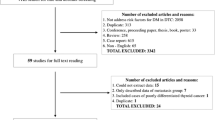Abstract
Background
The aim of this study was to evaluate the prognostic impact of further treatments in minimally invasive follicular thyroid carcinoma (MIFTC) patients.
Methods
The risk factors for distant metastases were analyzed, and the impact of surgical extent on distant metastasis was verified by using weighted logistic regression models with inverse-probability of treatment weighting (IPTW).
Results
166 patients including 31 males (18.7 %) and 135 females (81.3 %), with the mean age of 41.5 ± 13.5 years, were enrolled for this study. The median follow-up period was 103.5 months (range, 13–244 months). Seven patients (4.2 %) had distant metastases during follow-up period. The presence of vascular invasion (Hazard ratio [HR] = 29.06; 95 % Confidence Interval [CI] = 3.06–209.08; p = 0.015) and extensive vascular invasion ≥4 foci (HR = 40.57; 95 % CI = 2.09–789.13; p = 0.014) were the independent risk factors for distant metastasis by multivariate analysis. Surgical extent did not influence distant metastasis. Logistic regression with IPTW also demonstrated that there were no statistically significant differences in the development of distant metastasis based on surgical extent (HR = 1.28; 95 % CI = 0.15–10.87; p = 0.823).
Conclusions
The presence of extensive vascular invasion is the most powerful predictor of distant metastasis. However, it is noteworthy that further treatments do not demonstrate an advantageous effect on preventing distant metastasis during the follow-up period.


Similar content being viewed by others
References
DeLellis R, Lloyd R, Heitz P et al (2004) WHO classification of tumours pathology and genetics of tumours of endocrine organs. IARC Press, Lyon, pp 73–76
Sugino K, Kameyama K, Nagahama M et al (2014) Does completion thyroidectomy improve the outcome of patients with minimally invasive follicular carcinoma of the thyroid? Ann Surg Oncol 21(9):2981–2986
O’Neill CJ, Vaughan L, Learoyd DL et al (2011) Management of follicular thyroid carcinoma should be individualised based on degree of capsular and vascular invasion. Eur J Surg Oncol 37(2):181–185
Sugino K, Kameyama K, Ito K et al (2012) Outcomes and prognostic factors of 251 patients with minimally invasive follicular thyroid carcinoma. Thyroid 22(8):798–804
Ito Y, Hirokawa M, Masuoka H et al (2013) Prognostic factors of minimally invasive follicular thyroid carcinoma: extensive vascular invasion significantly affects patient prognosis. Endocr J 60(5):637–642
D’Avanzo A, Treseler P, Ituarte PH et al (2004) Follicular thyroid carcinoma: histology and prognosis. Cancer 100(6):1123–1129
Collini P, Sampietro G, Pilotti S (2004) Extensive vascular invasion is a marker of risk of relapse in encapsulated non-hürthle cell follicular carcinoma of the thyroid gland: a clinicopathological study of 18 consecutive cases from a single institution with a 11-year median follow-up. Hisopathology 44(1):35–39
Lo CY, Chan WF, Lam KY et al (2005) Follicular thyroid carcinoma: the role of histology and staging systems in predicting survival. Ann Surg 242(5):708–715
Asari R, Koperek O, Scheuba C et al (2009) Follicular thyroid carcinoma in an iodine-replete endemic goiter region: a prospectively collected, retrospectively analyzed clinical trial. Ann Surg 249(6):1023–1031
Besic N, Zgajnar J, Hocevar M et al (2005) Is patient’s age a prognostic factor for follicular thyroid carcinoma in the TNM classification system? Thyroid 15(5):439–448
Witte J, Goretzki PE, Dieken J et al (2002) Importance of lymph node metastases in follicular thyroid cancer. World J Surg 26(8):1017–1022
Ito Y, Hirokawa M, Higashiyama T et al (2007) Prognosis and prognostic factors of follicular carcinoma in Japan: importance of postoperative pathological examination. World J Surg 31(7):1417–1424
Sugino K, Ito K, Nagahama M et al (2011) Prognosis and prognostic factors for distant metastases and tumor mortality in follicular thyroid carcinoma. Thyroid 21(7):751–757
Source of funding
The authors received no specific funding for this work.
Author information
Authors and Affiliations
Corresponding author
Ethics declarations
Conflicts of interest
The authors declare that there is no conflict of interests regarding the publication of this paper.
Rights and permissions
About this article
Cite this article
Lee, YM., Lee, Y.H., Song, D.E. et al. Prognostic Impact of Further Treatments on Distant Metastasis in Patients With Minimally Invasive Follicular Thyroid Carcinoma: Verification Using Inverse Probability of Treatment Weighting. World J Surg 41, 138–145 (2017). https://doi.org/10.1007/s00268-016-3608-9
Published:
Issue Date:
DOI: https://doi.org/10.1007/s00268-016-3608-9




